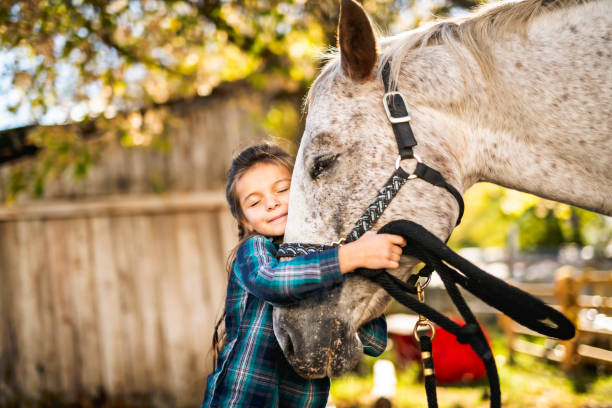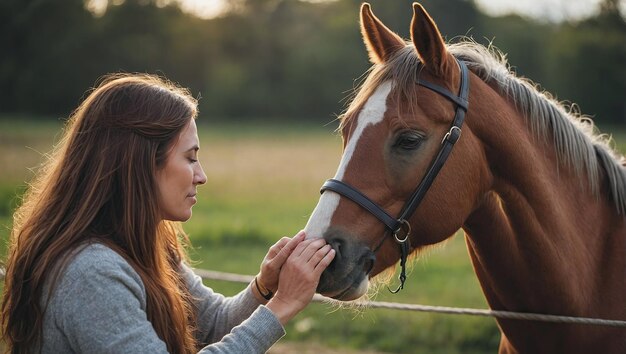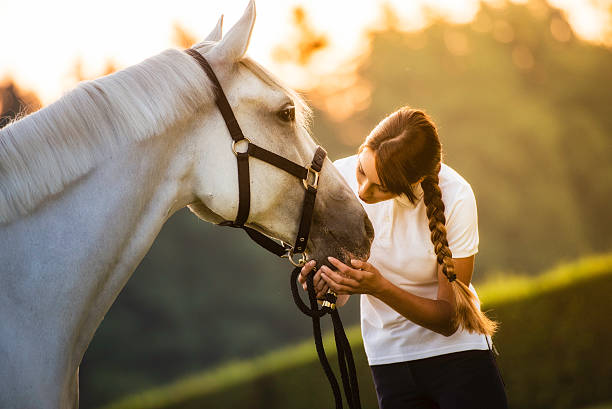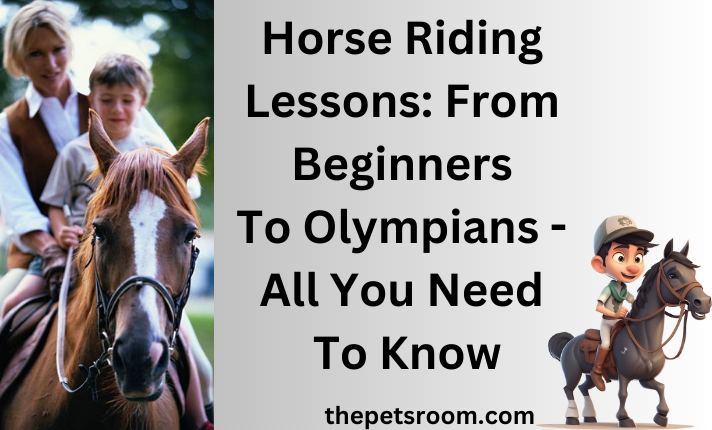Learn about the significance to Horse Companionship and how it helps your horse’s overall health. Find out the advantages from having an equine companion including reducing stress and improving your emotional health. Since the beginning of time horses have played a crucial part in the history of mankind including aiding in the field of transportation and agriculture, and even serving as faithful allies during periods of peace and conflict.
The connection between horses and humans is rooted in trust and respect. It is growing into an intimate and unique relationship. This article will explore the numerous advantages of horse-related companionship, shining light on the physical, emotional as well as social benefits that result from establishing an emotional bond with these majestic horses.
Emotional Benefits
Stress Relief and Mental Health
A time spent with horses is an effective remedy to the stressors of modern life. The tranquility that these majestic beasts provide, as well as the rhythmic movements of riding could benefit alleviate anxiety and encourage relaxation. Horse-assisted activities, for instance therapy riding, are proven to impart substantial positive mental wellbeing. These programs are specifically designed to benefit individuals deal with stress, reduce depression symptoms and rise the overall state of mind. The process of grooming and taking care of horses can be a meditation practice and allows individuals to get away from their worries and concentrate on the present.
Building Emotional Intelligence
The interaction with horses requires an acute comprehension of their non-verbal cues as well as behaviours. Horses are extremely perceptive capable of detecting the human emotion and responding accordingly. When they learn to read the signals they send people can improve their empathy and apathy. The method of communication and understanding improves emotional intelligence and creates more intimate connections, not only to horses, but also human beings as well. The abilities gained from developing an emotional connection with horses can be translated into better interpersonal relationships as well as better emotional regulation in everyday life.
Boosting Confidence and Self-Esteem
The process of learning to take care of and ride horses often brings an increase in self-confidence and confidence. Understanding the various aspects of horsemanship, from simple grooming to advanced techniques for riding gives you a sense of satisfaction and pride. Being able to overcome challenges and achieve landmarks in this field can make people feel empowered, thereby making them feel confident and resilient. The new confidence they recieve extends far beyond the confines of the barn and can positively affect other aspects of life, including school, work as well as personal relationships. The bond between a horse that is based upon trust and respect, increases the belief in one’s self-worth and a sense of belonging.
Exercise and Physical Fitness
The sport of horse riding is generally thought of as an all-body workout that involves muscles that aren’t typically utilized in normal routine activities. It demands an array of flexibility, strength, and endurance. Riders have to utilize their core muscles in order to maintain their balance and stability, as their arms and legs help keep the horse in check. Continuously engaging different muscle groups can help boost the overall fitness of the horse. Furthermore, the everyday maintenance routines that are part of the ownership of horses, such as feeding, grooming and cleaning out stalls are also a source of physical exercise. These chores are physically demanding, and can benefit improve the health of your heart and muscles.
Improving Balance and Coordination
The horse’s ride requires the highest degree of coordination and balance. When the horse is moving in a particular direction, the rider has to adjust their body posture to remain in a stable position and maintain control. This dynamic interaction helps strengthen the muscles of the core that support the rider and increases coordination their movements. As time passes, riders gain more posture and better awareness of their bodies, which could aid in other physical activities as well as decrease the chance of injury.
Promoting Outdoor Activity
The sport of horseback riding naturally inspires people to go out and about and to live a more active life. Be it riding on trails, taking part in competitions or simply taking an enjoyable ride, riding in the company of horses usually means being outdoors in nature. The outdoors can provide an enjoyable break from indoor surroundings, and can benefit improve physical and mental health. Horses can encourage a more active lifestyle by encouraging people to discover new outdoor activities and remain physically active.
Social Benefits
Community and Social Connections
The world of equestrians provides a myriad of opportunities to meet others who are passionate about horses. Participating in equestrian clubs, groups or stables creates an atmosphere of belonging and community. Social networks offer additional an opportunity to share experiences, learning from each other and for forming lasting friendships. Participating in horse-related events or races also give opportunities to meet people with diverse backgrounds, which further enhances friendships.
Teamwork and Collaboration
The care and treatment of horses usually requires teamwork and collaboration. Working with stablemates, trainers or taking part in lessons with other riders participants learn the value of collaboration and cooperation. These experiences impart important lessons in solving problems, communication and working in tandem towards common objectives. The nature of horses that are collaborative activities help to create strong bonds and strengthens interpersonal abilities.
Enhancing Communication Skills
Horses require an effective and clear communication both non-verbal and verbal. Riders need to use body communication, voice commands and signals for communicating with their horse. Learning to convey intent and understanding how to respond can greatly boost the overall quality of communication knowledge. The ability to recognize subtle signals and react appropriately can result in better interactions with others, improving the quality of both your personal as well as skillful relationships.
Educational Benefits
Learning Responsibility and Discipline
The responsibility of caring for and owning the horse is an important commitment that imparts the importance of responsibility and discipline. Routines of daily care like feeding, grooming and working out the horse require constant effort and commitment. These duties can instill a sense and accountability, thereby highlighting the importance of routines and dependability. Being able the art of managing time, and prioritizing tasks are talent which can benefit individuals in every aspect of their lives.
Understanding Animal Behavior
Learning about the horse’s psychology and behavior is an interesting aspect of horse-human friendship. Being able to recognize and respond to the actions of a horse improves understanding of animal behavior and increases empathy. This understanding can be used to interact between animals and humans, creating an appreciation for the world around us. In addition, it serves as the foundation for further research in fields like animal science, veterinary medicine and the equine therapy.
Educational Programs and occupation Prospects
This world has many educational opportunities as well as job opportunities. From veterinary science to equine therapy to riding lessons and management of stables there are numerous avenues for people who are enthralled by horses. Engaging in equestrian activities may inspire a fascination for these areas, which can lead to education and rewarding career paths. The programs and certificates in horse care as well as training and therapy favor important abilities and expertise, allowing for many well-qualified opportunities.
Therapeutic Benefits
Equine-Assisted Therapy
Equine-assisted therapy is a variety of therapeutic riding courses designed for people suffering from physical, emotional, or cognitive issues. These programs utilize the unique characteristics of horses to promote healing and personal development. Horses and riding could boost motor skills balance, balance, and coordination for people with physical impairments.
The emotional connection that a horse has between a horse and its owner can benefit people develop confidence, trust and self-esteem. Cognitive benefits include improved concentration as well as problem-solving skills and emotional control. Programs for therapeutic riding are recognized for their positive effect on various populations, ranging from children who have autism to veterans suffering from PTSD.
Emotional Support and Companionship
Horses grant unparalleled emotional comfort and support. They are gentle and their the ability to connect with people in a way that is emotional are ideal to those who seek peace and peace. Horses are able to sense and react to human emotions, providing an equine companionship in times of anxiety or sadness. The emotional connection can ease feelings of isolation and favor the feeling of belonging and purpose. The bond of a horse is a source of unending love and support, enriching lives of the people who experience it.
Unique Experiences and Personal Stories
Personal Anecdotes
Horse owners’ personal stories reveal the significant impact that horses have on people their lives. These stories often demonstrate the positive effects of horse companionship by revealing personal development, healing, and happiness. These stories provide readers with a range of relatable and inspirational illustrations of ways horses can enhance their lives.
Positive Stories of Success from Therapeutic Programs
Testimonials of people who have experienced the benefits of the therapeutic benefits of horses serve convincing evidence of its efficacy. These positive stories illustrate the many ways the therapeutic programs for riding have assisted people overcome obstacles and boost their life quality. For everything from physical recovery to healing emotional these stories impart an engaging account of the advantages of horse-based companionship.
Equine Companion
A horse that interacts socially and offers emotional support to humans or other horses is known as an equine buddy. Since horses are gregarious creatures, they benefit greatly from company, which lowers stress and avoids behavioral problems. To keep their emotions in check, they play, groom each other, and stay close.
Equine Companionship
The relationship that horses have and their interactions with people or other horses are referred to as equine companionship. Horses benefit from social connections and live in herds by nature, which helps to maintain their mental well-being. They also develop close relationships with others by reciprocal emotional support and frequent engagement based on trust.
FAQS
Do Horses Need a Companion?
Yes, in order to prevent stress and loneliness, horses often require a partner. Since horses are herd animals, they feel safer and happier in groups with other horses. By facilitating the essential social connection, companionship promotes overall wellbeing and helps avoid behavioral problems.
Can Cattle and Horses Live Together?
Yes, if they are maintained appropriately, horses and cattle can coexist. Since their nutritional and social requirements vary, it’s critical to provide them with separate eating locations and enough room. Their harmonious coexistence is ensured by regular monitoring, and receiving the right care keeps them healthy and reduces conflict.
What symptoms indicate loneliness or stress in horses?
Excessive pacing, weaving, cribbing (biting on wood), and other repeated habits are indicators that a horse may be lonely or under stress. They could also grow hostile, lose interest in what’s going on around them, or struggle to concentrate. Regular companionship, mental stimulation, and social engagement may help reduce these symptoms.
How can I bring a new horse into an already-existing herd?
One way to reduce stress and possible violence in horses is to gently introduce them to new horses. Let the new horse study the current herd from a safe distance to begin with. Increase their relationships gradually while keeping an eye on things, making sure the new horse has its own place at first. Keep a tight eye on their relationships and be ready to remove them if there are any issues until they are able to work things out.
Conclusion
In the end, horse companionship plays an important role in improving the overall wellbeing and health of both horses and human companions. The physical, emotional and social benefits of having an animal companion are immense, providing peace of mind, increased confidence, and improved physical fitness for both horses as well as humans.
The connection between humans and horses, founded on trust and respect for each other, creates a positive connection that can contribute to the development of your personality and emotional well-being. From the therapeutic advantages unique to horses to the invaluable life lessons learned through caring and interactions, having horses as a friend profoundly affects lives, proving that these magnificent creatures are from just animals. They contribute to a balanced and fulfilling life.















Принимаем на себя всю ответственность за работу наших людей https://gruzchik-profi.ru/krupnogabaritnygruz
Если что-то было повреждено, мы исправим это или компенсируем стоимость https://gruzchik-profi.ru/upakovka
Все претензии мы рассматриваем в течении нескольких дней https://gruzchik-profi.ru/vyvozmusora
Также мы полностью несем ответственность за сохранность вашего имущества https://gruzchik-profi.ru/takelajnieuslugi
Бережная и быстрая транспортировка https://gruzchik-profi.ru/krupnogabaritnygruz
Вывоз строительного мусора https://gruzchik-profi.ru/kvartirnypereezfd
Услуги грузчиков от 350 ?/час https://gruzchik-profi.ru/kvartirnypereezfd
Гарантированы стоимость услуг без скрытых наценок, высокое качество, аккуратное обращение с грузом, индивидуальное сопровождение персональным менеджером https://gruzchik-profi.ru/takelajnieuslugi
Заказать грузчиков в Москве https://gruzchik-profi.ru/vyvozmusora
Грузчики в Москве заказать недорого услуги грузчиков https://gruzchik-profi.ru/pereezdmagazina
Газель для переезда на дачу https://gruzchik-profi.ru/
Переезд клиники https://gruzchik-profi.ru/upakovka
Разнорабочие необходимы в разных процессах, связанных с перемещением объемных предметов https://gruzchik-profi.ru/vyvozmusora
Это может быть комплексный квартирный переезд или выгрузка большой партии товара https://gruzchik-profi.ru/pereezdsklada
Заказывают разнорабочих с транспортом и без него частные лица, представители бизнеса https://gruzchik-profi.ru/upakovka
Складские организации используют дополнительный персонал во время приема или отгрузки крупной партии товара https://gruzchik-profi.ru/
Предоставляемый перечень услуг:
Идеальный вариант для транспортировки компьютерной техники, бытовой меблировки, бумажных и деревянных изделий и прочих предметов, требующих защиты тента от пыли и влаги https://gruzchik-profi.ru/upakovka
взрослых людей; детей и младенцев; пожилых пациентов; беременных женщин https://altermed-clinic.ru/chto-lechim/chto-lechim2/parazitarnye-zabolevaniia/
Диагностика остеопата; Постановка клинического диагноза и определение остеопатической дисфункции; Рекомендации (при необходимости) по дальнейшему обследованию; Остеопатический сеанс; Рекомендации по дальнейшему лечению, образу жизни и питанию https://altermed-clinic.ru/bolezni-detej/koliki/
Цены на основные услуги остеопата (Москва)
Наши врачи творчески подходят к исцелению пациента, соединяя принципы остеопатии и классической медицины https://altermed-clinic.ru/doctors/buvaltseva/
Мы не отрицаем медицинские знания, УЗИ, анализы, фармакопею https://altermed-clinic.ru/izbavljaemsja-ot-golovnoj-boli-za-5-minut/
Мы лишь стараемся избавить наших пациентов от травматичного или неэффективного лечения https://altermed-clinic.ru/bolezni-detej/koliki/
Ведущий специалист / Доктор остеопатии https://altermed-clinic.ru/chto-lechit-vrach-osteopat-hlystovye-travmy/
Консультации https://altermed-clinic.ru/golovnaya-bol-kak-lechit/
Гарантия на запчасти и технику https://agora-74.biz/katalog_zapchastej/podveska_mostov/obojma_d394_0202_019
Высокая проходимость https://agora-74.biz/katalog_zapchastej/most_perednij/kronshtejn_glavnoj_peredachi_d395v_62_00_011
Андрей (частное лицо)
Челябинск, Челябинская область https://agora-74.biz/katalog_zapchastej/kardannaya_peredacha/val_dz_98_16_01_230
Владельцев по ПТС https://agora-74.biz/katalog_zapchastej/kpp/shesternya_dz_98_10_04_166
Челябинск, Челябинская область https://agora-74.biz/katalog_zapchastej/most_perednij/korpus_salnika_d394_0201_088
Полка сплошная для сетчатых шкафов 800×1200 http://www.36box.ru/containers_small_par.htm
Ролл контейнер К 1 окрашенный http://www.36box.ru/boxes_milk_meat.htm
Борисоглебск http://www.36box.ru/profi2.htm
Пожаловаться http://www.36box.ru/articles.htm
04 http://www.36box.ru/boxes_for_meat.htm
02 http://www.36box.ru/index.htm
2015 №25423 http://www.36box.ru/metal_racks.htm
Безупречное качество сборки http://www.36box.ru/classic.htm
Это обеспечивает длительный срок службы любого товара http://www.36box.ru/universal_box.htm
Презентабельный внешний вид http://www.36box.ru/stellazhi_legk_zacep.htm
Шкафы и контейнеры окрашиваются защитной полимерной краской, которая не стирается и не портится под воздействием влаги или других агрессивных факторов http://www.36box.ru/catalog.htm
Многообразие выбора http://www.36box.ru/contacts.htm
Наши шкафы и контейнеры различаются по габаритам, грузоподъемности, массе, количеству полок и прочим факторам, имеющим значение в процессе эксплуатации http://www.36box.ru/article3.htm
Обратите внимание! Помимо этого в качестве крепежей можно применять дюбели, анкера и другие подобные изделия, которые при правильном монтаже обеспечивают не менее надежное фиксирование лаг, чем металлические уголки https://al-keram.ru/blog/keramzit-harakteristiki.html
В случае, если предполагается полный демонтаж деревянного пола и устройство бетонной стяжки, для последующей отделки декоративным покрытием (плиткой, ламинатом), следует позаботиться о маяках https://al-keram.ru/catalog-keramzita.html
Без правильно выставленных направляющих не получить ровной поверхности, необходимой для отделки напольным покрытием https://al-keram.ru/blog/20-40.html
Слой сухого керамзита проливают цементным молочком для закрепления гранул https://al-keram.ru/blog/5-10.html
После затвердения молочка поверхность выравнивают по маякам цементно-песчаным раствором https://al-keram.ru/blog/vozmozhnost-utepleniya-fundamentov-keramzitom.html
Полусухой Сначала засыпается керамзит, который выравнивается по маякам https://al-keram.ru/company/dostavka-keramzita.html
После этого устанавливается арматура и лента по периметру, насыпанный керамзит уплотняется https://al-keram.ru/blog/tsvetnoy-dekorativniy-keramzit.html
Заключительным этапом является заливка вторым слоем, который готовят из цемента и песка https://al-keram.ru/zakazat-keramzit-v-kotelniki.html
Существует три фракции керамзита: 5-10 мм, 10-20 мм, 20-40 мм https://al-keram.ru/blog/sbornye-suhie-poly.html
Выбирать керамзит следует исходя из толщины стяжки пола https://al-keram.ru/blog/uteplenie-keramzitom.html
Как правило стяжка не превышает 30 миллиметров, поэтому используют керамзит 1-2 фракции https://al-keram.ru/catalog-keramzit/keramzit-v-big-begah-fraktsii-5-10-m300-350-detail.html
Керамзит представляет собой небольшие гранулы небольшого веса за счет мелких пор, которые получаются в результате обжига глины https://al-keram.ru/kupit-keramzit-v-balashikhe.html
Таким образом, получается вполне экологичный природный материал, имеющий хорошие технические показатели, такие, как:
Live Coin Watch I appreciate you sharing this blog post. Thanks Again. Cool.